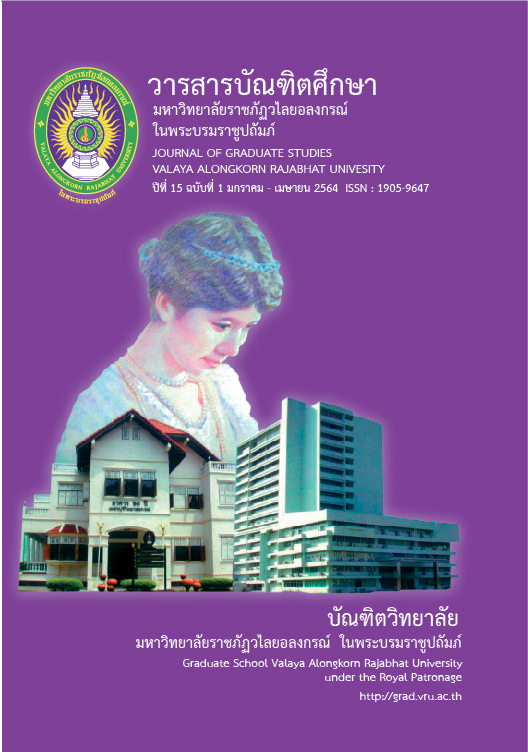THE DEVELOPMENT OF AUGMENTED REALITY IN MASSIVE OPEN ONLINE COURSE ON AUGMENTED REALITY USING UNITY AND VUFORIA PROGRAM FOR UNDERGRADUATE STUDENTS
Main Article Content
Abstract
The purposes of this research were intended to 1) develop the augmented reality in massive open online course on augmented reality using unity and vuforia program for Undergraduate Students and 2) study the learning achievement after studying with augmented reality in massive open online course on augmented reality using unity and vuforia program for Undergraduate Students. The samples consisted of two groups: 10 experts, and 20 students studying at Faculty of Education, Prince of Songkla University. The research instruments consisted of 1) augmented reality in massive open online course quality evaluation form, 2) content quality evaluation form, and 3) students learning achievement tests.
The conclusions were as follows 1) the opinions of experts on the augmented reality in Massive Open Online course on Augmented reality using unity and vuforia program for Undergraduate Students unveiled the highest level ( = 4.72, S.D. = .05) and 2) there was significantly higher learning achievement of the student in the posttest than in the pretest at .01 level.
Article Details

This work is licensed under a Creative Commons Attribution-NonCommercial-NoDerivatives 4.0 International License.
บทความทุกเรื่องได้รับการตรวจความถูกต้องทางวิชาการโดยผู้ทรงคุณวุฒิ ทรรศนะและข้อคิดเห็นในบทความ Journal of Global of Perspectives in Humanities and Social Sciences (J-GPHSS) มิใช่เป็นทรรศนะและความคิดของผู้จัดทำจึงมิใช่ความรับผิดชอบของบัณฑิตวิทยาลัย มหาวิทยาลัยราชภัฏวไลยอลงกรณ์ ในพระบรมราชูปถัมภ์ กองบรรณาธิการไม่สงวนสิทธิ์การคัดลอก แต่ให้อ้างอิงแหล่งที่มา
References
Alhazzani, N. (2020). MOOC’s impact on higher education. Social Sciences & Humanities Open. 2(1), 1-6.
Azuma, R., A. (1997). A survey of Augmented Reality. Presence: Teleoperators and Virtual Environments, 6(4), 355-385.
Fisk, P. (2017). Education 4.0 … the future of learning will be dramatically different, in school and throughout life. Retrieved from http://www.thegeniusworks.com/2017/01/future-education-young-everyone-taught-together
Kaosaiyaporn, O. (2017). kānphatthanā rūpbǣp sapphayākō̜n kānsưksā bǣp pœ̄t dān kānrīanrū watthanatham thī songsœ̄m thaksa khwām fai rū khō̜ng phū rīan ʻudomsưksā [The Development of Open Educational Resources of Cultural Learning Model that Enhance Inquiring Skills of Higher Students Skills]. Journal of Education Prince of Songkla University. 28(2), 38-47.
Littlejohna, A., Hood, N., Milligan, C., & Mustain, P. (2016). Learning in MOOCs: Motivations and self-regulated learning in MOOCs. The Internet and Higher Education. 29, 40-48.
Na-Songkhla, J. (2018). kānʻō̜kbǣp kān rīan nǣo dičhithan [Digital learning design]. Bangkok: Chulalongkorn University Press.
Pornsrima, D. (2016). khrū Thai 4.0 [Thai Teacher 4.0]. Matichon online. Retrieved from https://www.matichon.co.th/columnists/news_345042
Prompalad, N. (2017). kānphatthanā rūpbǣp kān rīan bǣp sư̄pso̜ hākhwām rū dōi chai theknōlōyī samư̄an čhing nai saphāpwǣtlō̜m kān rīan bǣp yūbikwitat phư̄a songsœ̄m khwāmkhit sāngsan dān sinlapa ʻItsalām [Development of Inquiry-based Learning Model by Using Augmented Reality in Ubiquitous Learning Environment to Enhance Creativity of Islamic Arts]. Master's thesis. Prince of Songkla University.
Sinlarat. P., et al. (2016). kānsưksā Thai 4.0 pen ying kwā kānsưksā [Education 4.0 is more than Education]. Annual Academic Seminar of the Teacher’s Council 2016 on the topic of Research of the Learning Innovation and Sustainable Educational Management. Bangkok: The Secretariat Office of Teacher’s Council.


